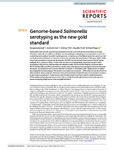2020-03-09Zeitschriftenartikel
Genome-based Salmonella serotyping as the new gold standard
Banerji, Sangeeta
Simon, Sandra
Tille, Andreas
Fruth, Angelika
Flieger, Antje
Salmonella enterica is the second most reported bacterial cause of food-borne infections in Europe. Therefore molecular surveillance activities based on pathogen subtyping are an important measure of controlling Salmonellosis by public health agencies. In Germany, at the federal level, this work is carried out by the National Reference Center for Salmonella and other Bacterial Enteric Pathogens (NRC). With rise of next generation sequencing techniques, the NRC has introduced whole-genome-based typing methods for S. enterica in 2016. In this study we report on the feasibility of genome-based in silico serotyping in the German setting using raw sequence reads. We found that SeqSero and seven gene MLST showed 98% and 95% concordance, respectively, with classical serotyping for the here evaluated serotypes, including the most common German serotypes S. Enteritidis and S. Typhimurium as well as less frequently found serotypes. The level of concordance increased to >99% when the results of both in silico methods were combined. However, both tools exhibited misidentification of monophasic variants, in particular monophasic S. Typhimurium and therefore need to be fine-tuned for reliable detection of this epidemiologically important variant. We conclude that with adjustments Salmonella genome-based serotyping might become the new gold standard.
Dateien zu dieser Publikation

